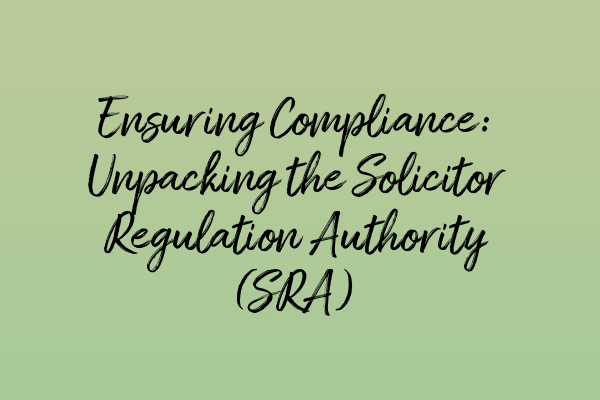Ensuring Compliance: Unpacking the Solicitor Regulation Authority (SRA)
Introduction:
In the world of law, regulatory bodies play a crucial role in maintaining ethical standards, professional conduct, and ensuring the quality of legal services. For solicitors in the United Kingdom, the Solicitor Regulation Authority (SRA) takes the lead in regulating the profession. In this blog post, we will delve into the SRA and its role in ensuring compliance within the legal sector. Whether you’re an aspiring solicitor or a legal professional looking to refresh your knowledge, this article will provide you with a comprehensive understanding of the SRA’s responsibilities and the importance of compliance in legal practice.
1. What is the SRA?
The Solicitor Regulation Authority (SRA) is an independent regulatory body that oversees solicitors and law firms in England and Wales. It was established in 2007 and operates under the Legal Services Act 2007. The primary goal of the SRA is to maintain public trust in the legal profession by promoting high ethical standards, competence, and professional conduct among solicitors. By regulating solicitors, the SRA plays a pivotal role in upholding the rule of law and ensuring access to justice for all.
2. Key Responsibilities of the SRA:
The SRA is entrusted with various responsibilities to achieve its mission of regulating the legal profession effectively. Some of these responsibilities include:
2.1 Code of Conduct:
One of the essential aspects of the SRA’s role is the establishment of a Code of Conduct for solicitors. This code provides a set of ethical principles and standards that solicitors must adhere to in their professional practice. It covers areas such as confidentiality, integrity, and maintaining client trust. The SRA ensures that solicitors are aware of these requirements and takes appropriate action if they fail to comply.
2.2 Education and Training:
The SRA is also responsible for setting the education and training requirements for aspiring solicitors. This includes overseeing the Legal Practice Course (LPC) and ensuring the quality and relevance of legal education. By setting rigorous standards, the SRA ensures that solicitors are adequately equipped with the necessary skills and knowledge to practice law competently.
2.3 Supervision and Compliance:
To maintain the integrity of the legal profession, the SRA actively monitors and supervises solicitors and law firms. This involves carrying out regular inspections, investigations, and audits to ensure compliance with regulatory obligations. The SRA holds solicitors accountable for their professional conduct and takes necessary disciplinary actions against those who breach the rules.
2.4 Protecting the Public:
Protecting the interests of the public is a fundamental objective of the SRA. They achieve this through various mechanisms, including setting robust entry standards for solicitors, providing guidance to the public on engaging with legal services, and handling complaints against solicitors. By safeguarding the public from unethical practices, the SRA maintains the public’s trust in the legal profession.
3. The Role of Compliance:
Compliance with regulatory standards is essential for solicitors and law firms to operate legally, protect their clients’ interests, and maintain professional credibility. The SRA sets out clear guidelines and requirements for compliance, and it is crucial for solicitors to understand and adhere to these standards.
3.1 Ethical Considerations:
The SRA’s Code of Conduct sets out a range of ethical considerations that solicitors must prioritize. These include acting in the best interests of clients, maintaining confidentiality, avoiding conflicts of interest, and providing competent and diligent advice. By upholding ethical standards, solicitors can build trust with their clients and contribute to the overall integrity of the legal profession.
3.2 Regulatory Obligations:
Solicitors have a legal obligation to comply with the SRA’s regulatory requirements. This includes submitting accurate and timely reports, maintaining appropriate accounting systems, and cooperating with regulatory investigations. Failure to comply with these obligations can result in disciplinary action and potential damage to a solicitor’s professional reputation.
4. Importance of Compliance in Legal Practice:
Compliance with the SRA’s regulations is more than just a legal requirement; it is a fundamental aspect of maintaining a successful legal practice. Here are a few reasons why compliance should be a priority for solicitors:
4.1 Professional Reputation:
Clients expect their solicitors to act professionally and ethically. By ensuring compliance with the SRA’s regulations, solicitors can establish and maintain a positive professional reputation, which can lead to client satisfaction, referrals, and long-term success.
4.2 Risk Management:
Compliance helps solicitors identify and mitigate potential risks in their practice. By following the SRA’s guidelines on client care, confidentiality, and file management, solicitors can reduce the likelihood of professional negligence claims and other legal disputes.
4.3 Business Opportunities:
Many clients prioritize working with solicitors who can demonstrate their commitment to compliance. By effectively complying with the SRA’s regulations, solicitors can attract and retain clients, gaining a competitive advantage in the legal marketplace.
Conclusion:
Compliance with the SRA’s regulations is crucial for solicitors to maintain public trust, protect their clients’ interests, and uphold the integrity of the legal profession. By understanding the role of the SRA and prioritizing compliance, solicitors can build successful careers and contribute to a fair and just legal system. Whether you’re an aspiring solicitor or an established legal professional, keeping up with the SRA’s requirements is essential for professional growth and ensuring the highest standards of legal practice.
Related Articles:
– A Closer Look at the Bar Professional Training Course (BPTC)
– The Role of Technology in Modern Legal Practice
– Financing Your Law Degree: Understanding Costs and Options
– A Look into Prominent Law Firms in the UK
– Staying Ahead: Current Legal Industry Trends in the UK


Leave a Reply